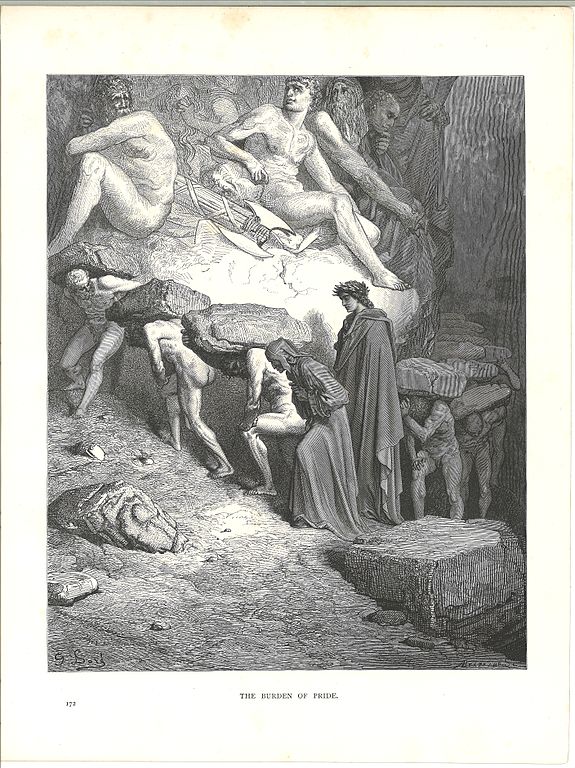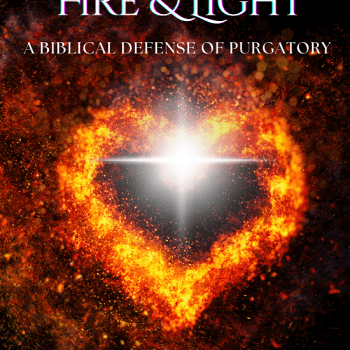
It’s an extremely serious business when we meet God face to face. There won’t be any more of this “imputation” — merely “covering over” of sins) then. No, we must be sinless to be in His presence, because that is how we were created to be in the first place, in His image. Therefore, we have to be cleansed of actual sin (sanctification in Protestantism). There is no question about that, from either side.
The only difference is a quantitative one: Protestants seem to think this all occurs in an instant; Catholics think it will involve a process, more like how our life on earth is. To me, that is where the heart of this discussion lies. I think it is a very simple and straightforward one, myself, not at all complex or hard to understand (like the intricacies of justification or predestination or Mariology). And I think that once purgatory is properly explained to Protestants, and grounded in Scripture, that they will have no objection to it, just as C. S. Lewis did not.
One Protestant I was interacting with, stated: “God will certainly remove the filth of the flesh prior to the resurrection of our bodies.” Precisely, and that is what purgatory is; no Protestant should have the slightest objection to it. The big beef is (or should be) about merely how long this “removal of filth” takes.
Big wow. Why all the stink about this, then? Obviously, human beings want to avoid suffering as much as possible, so the Protestant view (as so often) is very appealing to our flesh and our selfishness. Instant heaven, instant glorification at death, instant salvation, instant eternal security, instant expert on the Bible and the spiritual life (because “now I am saved!!!!!”). Etc.
Very enticing, especially for spoiled, gluttonous, fast-food, “gimme everything right now,” self-obsessed Americans. Who wants to suffer more? Ah, but the only slight problem with this natural desire is that the Bible talks constantly of suffering as a means of attaining to holiness and wisdom. How quickly we forget the book of Job and all of St. Paul’s intense sufferings (and he says to “imitate” him).
Even in the glorious, fabulous passage of Romans 8, where Paul is all excited about the Holy Spirit and how He helps us overcome all obstacles, what does he also say? He is going along, talking like a good “born again,” sanctified, set-free, “filled with the Holy Go” evangelical Protestant, and then suddenly (unless one ignores this part, as I did in my Protestant days) he becomes a morbid, masochistic, crucifix-clutching Catholic and takes away everyone’s fun and peaches and cream:
. . . if children, then heirs, heirs of God and fellow heirs with Christ [yippeeeeee!!!!!!!], provided we suffer with him in order that we may also be glorified with him. (Rom 8:17; RSV)
Booooooo!!! Get a life, Paul! What a party pooper Paul is. Why can’t he lighten up and accept what Jesus has for him? How did he get so Catholic???? What a bummer. What a drag. Someone needs to straighten him out quick about what the “victorious” Christian life is all about.
The souls in purgatory are spirits without bodies, so the suffering is a spiritual, “mental” chastisement from God (a very common biblical theme) in order to purify us and make us holy, not physical torture. It will involve an anguish at our sin and sorrow and contrition over it, and the painful desire to attain to that holiness which God has ultimately called us to.
But the suffering is accompanied also by great joy and hope (greater, in fact, than any in this life), because the soul in purgatory is already saved by virtue of being there (that’s where the real “eternal security” can be had, at long last). He or she is being prepared — made fit — for heaven.
We see many things like this in this life. Childbirth would be a close parallel. I’ve seen four of them myself, and I marveled at how my wife went through this tremendous agony, yet had a peace and joy even during the suffering, and an ecstatic joy upon the birth and seeing her child, immediately forgetting what had just gone on (as Jesus said).
That is how we will feel after emerging from purgatory finally clean and gazing upon our Lord’s beautiful and glorious face. There won’t be a moment’s thought then as to whether the preparatory suffering was worth it or not (Rom 8:18). And we will understand even more fully in purgatory why it was necessary, and wonder how we could ever have been so silly to have ever denied the necessity of it.
*****
Meta Description: Brief treatment of the doctrine of purgatory: the cleansing process for many of the saved after death, on the way to heaven.
Meta Keywords: afterlife, Hades, intermediate state, penance, penance for the dead, Prayer for the dead, purgatory, Sheol, netherworld, last things, eschatology













